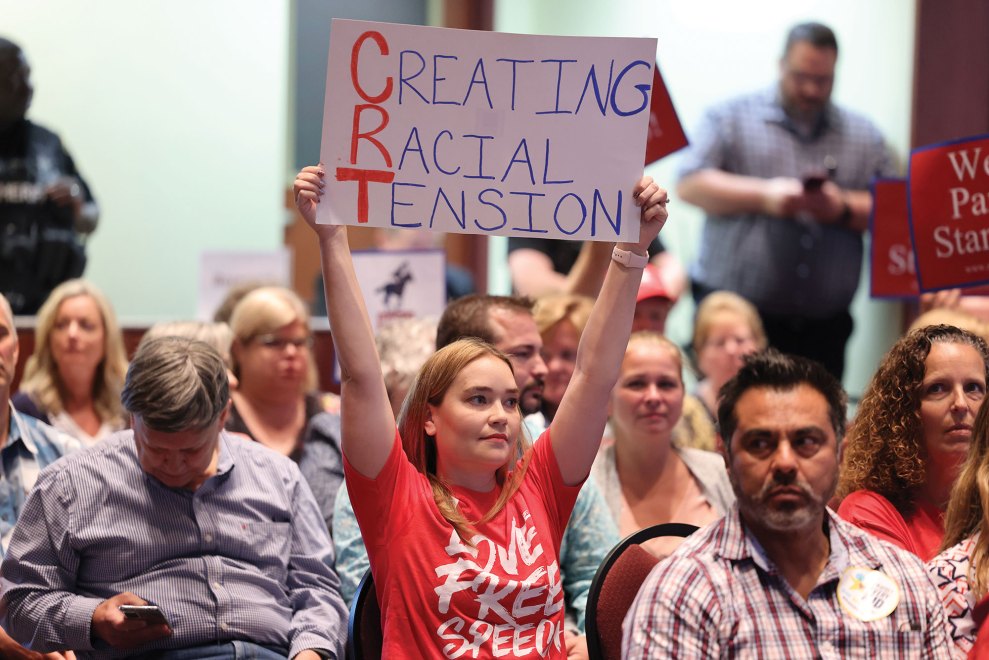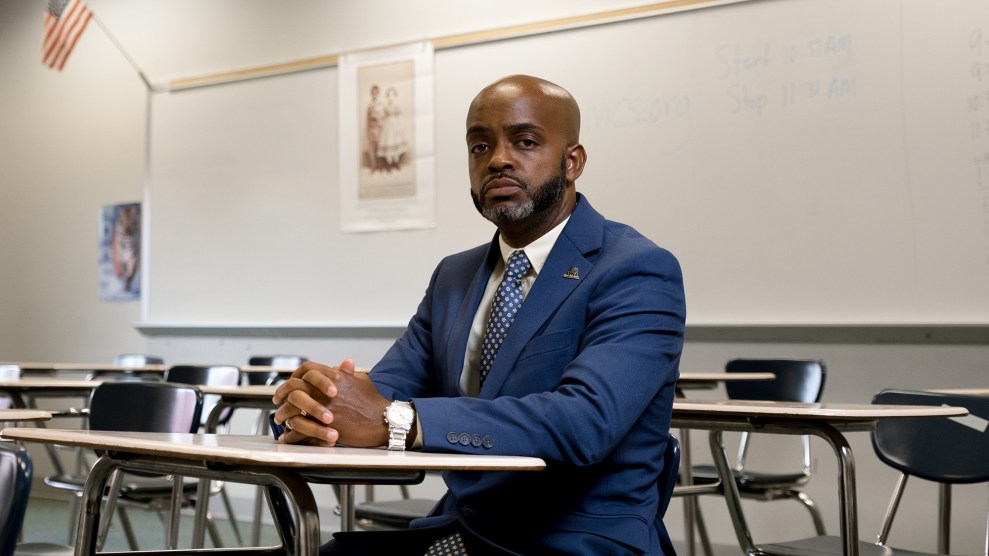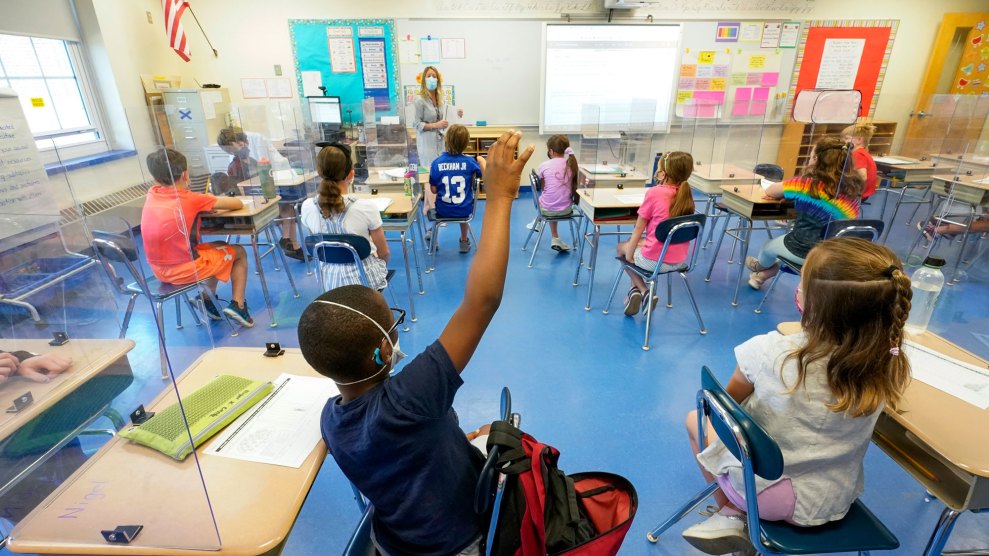There have been many contributions to help make sense of the Republican obsession with critical race theory, a framework developed some 40 years ago to analyze the ways racism is endemic to our laws and policies. Conservatives have decided it’s a domestic threat, and, as of this writing, 11 states have already banned teaching it in public schools. But perhaps the best explanation for the hysteria is in a journal entry written on April 7, 1829, by a schoolteacher named Susan Nye Hutchison, who lived in Augusta, Georgia, and whose diaries illuminate a quarter century of life before the Civil War. “Great fear begins to be prevalent that the negroes are about to rise,” Hutchison wrote.
For more articles read aloud: download the Audm iPhone app.
Georgians had experienced a spate of fires, as rumors of insurrection made the citizens of Augusta both negro- and pyro-phobic. Four days before Hutchison’s entry, another “terrible fire” burned about a third of the city, according to a contemporary news article. Estimated damages totaled half a million dollars, with nearly 350 homes destroyed. Hysteria ensued, and enslaved Black people were blamed, rounded up, and tried without evidence.
Months later, a pamphlet named the Appeal, David Walker’s polemic against slavery, emerged in the South. “My object is, if possible,” Walker, a free Black man, wrote, “to awaken in the breasts of my afflicted, degraded and slumbering brethren, a spirit of inquiry and investigation respecting our miseries and wretchedness.”
Southern politicians viewed Walker’s Appeal and its repudiation of their values as “incendiary,” a pyrotechnic of another kind. When Walker’s treatise reached his hometown of Wilmington, North Carolina, magistrate James McKee issued a warning to Gov. John Owen:
The dissemination of Walker’s pamphlet…[proves] beyond a doubt that a systematic attempt is making by some reckless persons at the North to sow sedition among the slaves [of] the South, and that this pamphlet is intended and well calculated to prepare the minds of the slave population for any measure, however desperate, that they may propose for accomplishing their emancipation…unless some measures are taken to counteract this design in time, I fear the consequences may be serious to the extreme.
North Carolina quickly passed two laws aimed at stemming slave rebellions by repressing the spread of abolitionist literature. An Act to Prevent the Circulation of Seditious Publications made it a felony to import and distribute “any written or printed pamphlet or paper…the evident tendency whereof would be to excite insurrection, conspiracy or resistance.” A second law banned “the teaching of slaves to read and write,” saying it “has a tendency to excite dissatisfaction in their minds and to produce insurrection and rebellion to the manifest injury of the citizens of this State.”
Walker’s Appeal also led to Georgia’s December 1829 anti-literacy law, which made circulating insurrectionary texts punishable by death. Virginia, Missouri, and others followed. As a Missouri state archive website puts it, the bans were deemed necessary because “an uneducated black population made white citizens feel more secure against both abolitionists and slave uprisings.”
“This is a terrorist assault in our country, and rioting cannot be tolerated,” Ted Cruz said last year as citizens rebelled against police murder. Republicans had little scripture to demonize protests against the public torture and execution of George Floyd, so they deferred their anti-rebellion rhetoric into new laws against looting, property damage, and even protesting, suggesting that failing to do so would bring a conflagration that would consume the country. “These people are violent, domestic extremists,” Marco Rubio said. “They hate the police, they hate the government, and they want this country to fall apart…some of them want a second civil war.”
Anti-protest bills were an opening salvo against the Black Lives Matter rebellions, but there would be another volley. As demonstrators and their allies picked up How to Be an Antiracist, White Fragility, and other books—which helped them articulate demands to dismantle white supremacy, to rebel against state-sanctioned murder, to call for defunding police and obliterating qualified immunity—Republicans turned to locking down these texts and the ideas they carry.

A school board meeting in Loudon County, Virginia.
Evelyn Hockstein / Reuters
From 2012 to 2019, critical race theory was mentioned on Fox News only four times. From June 2020 to May 2021, it was mentioned in 150 broadcasts. By July, it was 250 times a week. Christopher Rufo, a Manhattan Institute fellow who started banging the CRT drum on the network, was quite frank about how and why he’d engineered the upward trend. “The goal is to have the public read something crazy in the newspaper and immediately think ‘critical race theory.’ We have decodified the term and will recodify it to annex the entire range of cultural constructions that are unpopular with Americans,” he tweeted in March.
In attacking the things they’ve labeled as critical race theory, Republicans are seeking to erase the entire contemporary genre of abolitionist oratory. Critical race theory, diversity training, anti-racism, DEI, discussions of white fragility, Nikole Hannah-Jones and her New York Times 1619 Project—to them, it’s all interchangeable jargon in the Black Lives Matter anthem, seditious lyrics that prelude uprisings against the proper order of things. This campaign to annihilate anti-racist speech is not only the ideological offspring of the laws banning abolition literature; it’s a ruse to veil their hatred and fear of Black Lives Matter rebellions.
Literacy among enslaved Africans was not always antithetical to slavery in the colonies. It was once permissible for the enslaved to read Bibles, but when colonists realized the skill could be a gateway to liberation, literacy was outlawed. The first anti-literacy legislation in the colonies was in the wake of South Carolina’s 1739 Stono Rebellion, led by the purportedly literate slave Jemmy and resulting in the death of some 25 white people, as many as 50 Black people, and the burning of at least six plantations. Afterward, the colony passed An Act for the Better Ordering and Governing Negroes and Other Slaves in This Province. The law contained a bevy of provisions to keep enslaved Africans in “subjection and obedience,” essentially ending manumission and prohibiting them from writing or growing their own food.
The fear of insurrection and rebellion—and the spread of thoughts and words that might fuel them—persists today. “Critical Race Theory teaches kids to hate our country and to hate each other. It is state-sanctioned racism and has no place in Florida schools,” said Ron DeSantis, Florida’s Republican governor. A bill he signed into law forbids teaching “that racism is not merely the product of prejudice, but that racism is embedded in American society and its legal systems in order to uphold the supremacy of white persons.” It also says educators “may not define American history as something other than the creation of a new nation based largely on universal principles stated in the Declaration of Independence.” The text echoes an op-ed article published in the Richmond Enquirer in 1856:
Every school and college in the South should teach that slave society is the common, natural, rightful and normal state of society. Any doctrine short of this contains abolition in the germ: for, if it be not the rightful and natural form of society, it cannot last, and we should prepare for its gradual but ultimate abolition…To teach such doctrines we must have Southern teachers and Southern school books. It is from the school that public opinion proceeds, and the schools should be set right. No teacher should be employed in a private family or public school at the South, who is not ready to teach these doctrines. Parents, trustees and visitors should look to this thing.
Former Trump adviser Steve Bannon shared this prophecy on his podcast in May. “The path to save the nation is very simple—it’s going to go through the school boards.” That fight played out mercilessly at the University of North Carolina, where the conservative-controlled board of trustees’ unprecedented obstructions to hiring Hannah-Jones caused her to walk away from a prestigious position on the journalism faculty.
Locally, parents have taken heed, turning school board hearings into tribunals to eradicate anti-racism. Elana Yaron Fishbein, founder of No Left Turn in Education, a grassroots movement against critical race theory, claimed in a letter to her district’s superintendent that such curricula “plan to indoctrinate the children into the ‘woke’ culture.”
And here is where she gives up what’s underneath the euphemisms. Fishbein wants to know: Would the lessons also address “black bigotry towards whites?” “America is not a ‘racist’ country,” she wrote. “White students who attend predominantly black inner-city schools fear for their lives daily,” but they do not declare “White Lives Matter” or “loot and vandalize their communities to bring attention to this issue.”
Fishbein’s fanaticism about Black-on-white bigotry helps us understand what can come from banning literature on slavery and racism. Her question has precedent: After purchasing his freedom, but unable to secure that of his wife and children, Denmark Vesey helped found Emanuel African Methodist Episcopal Church in Charleston. There he would plan a “rising,” a slave rebellion, reportedly set to have included more than 1,000 Black people. But Vesey’s rebellion, scheduled for June 16, 1822, was thwarted. Vesey was hanged, his church razed and not to be rebuilt until after the Civil War.
Two years after rebellions over the death of Trayvon Martin, one year after protests against the killing of Michael Brown, and one day after the 193rd anniversary of Vesey’s foiled rebellion, Dylann Roof walked into Denmark Vesey’s resurrected sanctuary and massacred nine Black Americans—after googling, in a query that would be echoed by Fishbein, “black on white crime.” Roof’s miseducation and fear of a Black uprising led him to that atrocity. Does this not vindicate efforts to teach the facts—and consequences—of our history?

















